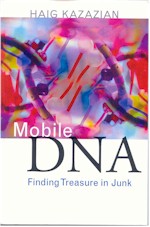 |
|
|
| ||||||
|
|
This page is the original source of this review, though you may also find it on Amazon or other sites. | ||
| Book Reviews Home | Free Audio Books | |
 |
Book Review of: Mobile DNAFinding Treasure in Junk Price: $48.34 Availability: Usually ships
within 24 hours |
| Review
of
Mobile DNA, by Author (Softcover, 2011) (You can print this review in landscape mode, if you want a hardcopy) Reviewer: Mark Lamendola, author of over 6,000 articles. The audience for this book is the biological researcher or other person with a professional interest in genetic research. This book would make an excellent companion for graduate (and perhaps undergraduate) studies in molecular biology, genetics, biochemistry, and related fields. The author is interesting and writes well, but to appreciate this book you probably need prior exposure to the genetic sciences. As I live in a metro area with a university that's renowned for medical research, I've attended a fair number of technical presentations in the same genre as this book. So, I have some basis on which to evaluate this book.
What I liked most about it is the author provides the human aspect to this often abstract research. While the science being discussed is real (and quite spectacular in terms of its value), his emphasis is on telling us about the people who do/did the research (at least, those in his lab) and some of the challenges they overcame. The "junk" referred to in the subtitle is the famous "junk DNA" that early genetic researchers could find no role for. The best they could tell, this DNA was just vestigial, some kind of junk left over from evolution. It turns out, however, this isn't junk after all. In fact, it's a treasure trove of genetic material. The "mobile" referred to in the title is a concept startling to many of us who had a fundamental education in genetics and haven't kept up with the latest developments. Rather than being fixed in place by some preordained instructions, some DNA actually moves from place to place within a genome. Dr. Kazazian explains quite a bit about this discovery and those who discovered it. Dr. Kazazian also explains the implications of mobile DNA. And in the final chapter, he makes some very interesting, thought-provoking predictions. I reviewed a pre-release version that consisted of 223 pages and 19 chapters. It also has 20 pages of references, nearly all of which are primary sources. If you want insight into some of today's most seminal and exciting research, this book is for you. | |
About these reviewsYou may be wondering why the reviews here are any different from the hundreds of "reviews" posted online. Notice the quotation marks? I've been reviewing books for sites like Amazon for many years now, and it dismays me that Amazon found it necessary to post a minimum word count for reviews. It further dismays me that it's only 20 words. If that's all you have to say about a book, why bother? And why waste everyone else's time with such drivel? As a reader of such reviews, I feel like I am being told that I do not matter. The flippancy of people who write these terse "reviews" is insulting to the authors also, I would suspect. This sound bite blathering taking the place of any actual communication is increasingly a problem in our mindless, blog-posting Webosphere. Sadly, Google rewards such pointlessness as "content" so we just get more if this inanity. My reviews, contrary to current (non) standards, actually tell you about the book. I always got an "A" on a book review I did as a kid (that's how I remember it anyhow, and it's my story so I'm sticking to it). A book review contains certain elements and has a logical structure. It informs the reader about the book. A book review may also tell the reader whether the reviewer liked it, but revealing a reviewer's personal taste is not necessary for an informative book review. About your reviewer
About reading styleNo, I do not "speed read" through these. That said, I do read at a fast rate. But, in contrast to speed reading, I read everything when I read a book for review. Speed reading is a specialized type of reading that requires skipping text as you go. Using this technique, I've been able to consistently "max out" a speed reading machine at 2080 words per minute with 80% comprehension. This method is great if you are out to show how fast you can read. But I didn't use it in graduate school and I don't use it now. I think it takes the joy out of reading, and that pleasure is a big part of why I read. |
| |||||